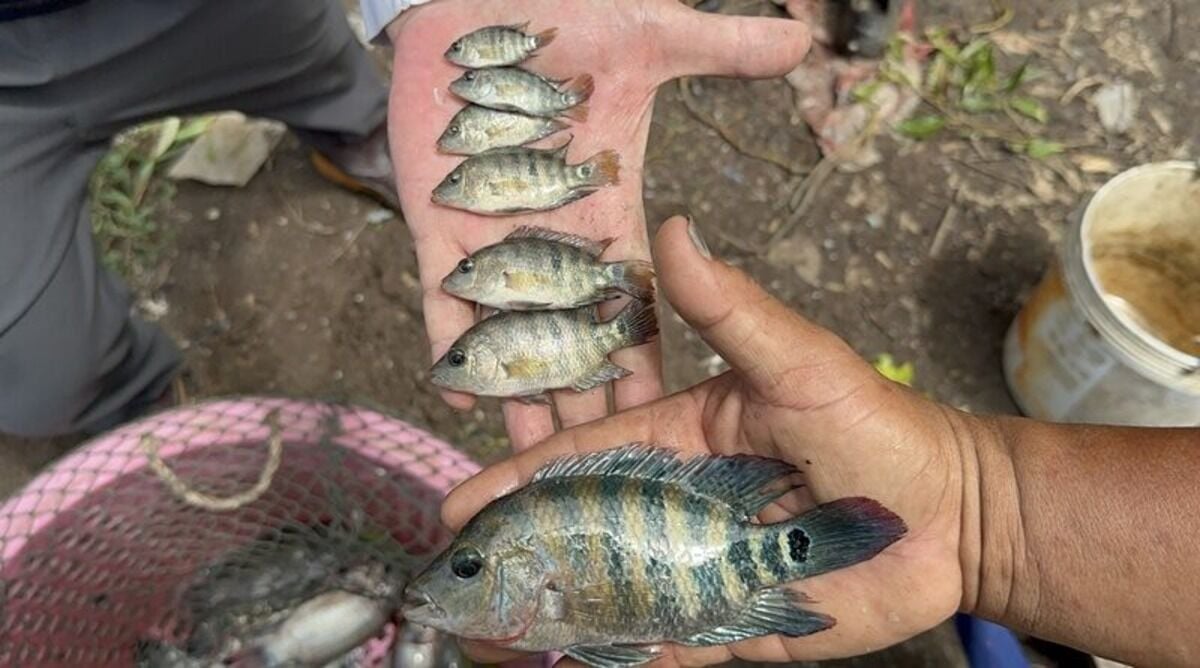Invasive fish species wreak havoc on Samut Prakan shrimp farms

Farmers in Samut Prakan are facing severe losses due to the infiltration of blackchin tilapia and Mayan cichlid into their shrimp ponds. These invasive fish species have been causing significant damage to the local aquaculture industry.
At a shrimp farm owned by Adisorn Chansuksawat, located in Village 7, Klong Dan subdistrict, Bang Bo district, the presence of blackchin tilapia and Mayan cichlid has been noted in large numbers. The farmers have expressed growing concerns about the potential for these fish to interbreed and further impact their livelihoods.
Upon examining the pond, numerous small blackchin tilapia fry, appearing to have recently hatched, were clustered along the shore. When a net was cast into the water, several adult blackchin tilapia and Mayan cichlid were caught, highlighting the extent of the problem. These fish are known for their predatory behaviour, which poses a threat to the shrimp and other aquatic species being cultivated by the farmers.
Adisorn Chansuksawat explained that both blackchin tilapia and Mayan cichlid have been devastating for the farmers, as they prey on valuable species such as juvenile cockles, shrimp, and crabs, which are essential to the local aquaculture. This has led to substantial financial losses.
Another affected farmer, 46 year old Piboon Kimyong reported that the invasive fish have significantly increased production costs. Previously, he could sell the shrimp, crabs, and cockles from his pond for tens of thousands of baht.
However, the infestation of these fish has drastically reduced his income, sometimes by several thousand baht. The blackchin tilapia are particularly problematic due to their rapid reproduction rate and large numbers, while the Mayan cichlid, although slower to reproduce, also contributes to the damage.
Investigation
Further investigation involved dissecting the fish to examine their intestines. It was found that the intestines of the Mayan cichlid are approximately twice the length of their bodies, whereas the intestines of the blackchin tilapia are about four to five times the length of their bodies. This observation might explain the faster reproduction rate of the blackchin tilapia compared to the Mayan cichlid.
Yanakorn Onlamai, a 33 year old farmer, noted that the Mayan cichlid has softer flesh and scales compared to the blackchin tilapia, which has tougher flesh and scales and requires more force to dissect. The difference in intestinal length between the two species suggests why the blackchin tilapia reproduces more quickly.
In light of these challenges, the farmers have called on the Samut Prakan Fisheries Department to provide education and proper procedures for managing these invasive species. They also requested the establishment of local purchasing units for the fish. Transporting the fish to distant locations for sale is not cost-effective due to fuel expenses, reported KhaoSod.
Latest Thailand News
Follow The Thaiger on Google News:


























